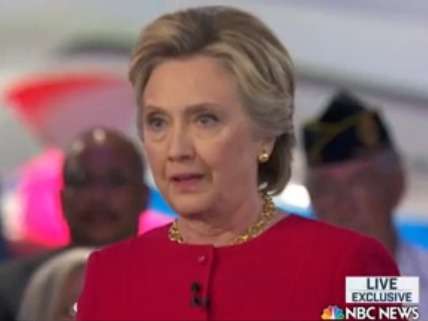Saying 'I Make No Excuses' for Mishandling Classified Material, Clinton Offers New One
The Democratic nominee continues to minimize her email "mistake" at the State Department.

During last night's presidential candidate forum in New York, moderator Matt Lauer asked Hillary Clinton about her use of a personal email system as secretary of state:
Lauer: You said you made not the best choice. You were communicating on highly sensitive topics. Why wasn't it more than a mistake? Why wasn't it disqualifying, if you want to be commander-in-chief?
Clinton: Well, Matt, first of all, as I have said repeatedly, it was a mistake to have a personal account. I would certainly not do it again. I make no excuses for it. It was something that should not have been done.
"I make no excuses for it"? That is all Clinton did for months after The New York Times revealed her email practices in March 2015.
A week after that report, she claimed she ''fully complied with every rule,'' "went above and beyond what I was requested to do," and "did not email any classified material to anyone." She also said she "opted for convenience to use my personal email account, which was allowed by the State Department, because I thought it would be easier to carry just one device for my work and for my personal emails instead of two."
As investigations by the State Department's inspector general and the FBI later showed, none of that was true. Clinton did not comply with every rule, she did not turn over all her work-related email to the State Department, she did email classified material, her use of a private email account was contrary to State Department policy, and she carried multiple devices despite saying she sought to avoid them.
In August 2015, Clinton conceded using a private email server "clearly wasn't the best choice," adding, "I take responsibility for that decision." Revising her earlier claim about sensitive material in her email, she said she was confident "I never sent, nor received, any email that was marked classified." According to the FBI, that was not true either.
Less than two weeks after Clinton supposedly took responsibility for not making the best choice, she was asked if she owed Americans an apology for the email controversy. "I am sorry that this has been confusing to people and has raised a lot of questions," she told NBC News. A few days later, she told the Associated Press there was no reason for her to apologize, because "what I did was allowed."
The next day, six months after the New York Times report, Clinton finally uses the m-word to describe her email practices, telling ABC News, "That was a mistake. I'm sorry about that. I take responsibility." Since then, however, Clinton has repeatedly sought to minimize her mistake, as when she falsely claimed that FBI Director James Comey had certified her inaccurate public statements as "truthful." In that same interview, Clinton falsely implied that retroactive classification accounts for any classified material in her email and passed the buck to "over 300 people" with whom she communicated by email, saying she relied on their judgments about the propriety of the conversations she had with them.
But that was then. Last night Clinton spoke in the present tense about what Comey called her "extremely careless" handling of sensitive communications, saying, "I make no excuses for it." Maybe she meant she had resolved to stop making excuses from that moment on.
If so, her resolve did not last long, because she immediately rolled out a new excuse. "Classified material has a header which says 'top secret,' 'secret,' 'confidential,'" she said. "Nothing—and I will repeat this, and this is verified in the report by the Department of Justice—none of the e-mails sent or received by me had such a header." So it's not that there was no classified material in Clinton's unsecured email, or that it was not classified at the time, or that it was not marked as classified—three earlier excuses that have been overtaken by the facts. Rather, Clinton now says, none of it carried a header indicating its classified status, as opposed to markings within the text.
Clinton may have finally settled on an excuse that happens to be true, but she is still trying to dodge the responsibility she claims to accept. As Lauer pointed out, Comey said "any reasonable person in Secretary Clinton's position should have known that an unclassified system was no place" for conversations involving top secret information, whether or not it was marked as such.
Clinton nevertheless stuck with her new excuse when she was questioned by a member of the audience, Lt. John Lester, an Air Force and Navy veteran who said he used to have "a top secret sensitive compartmentalized information clearance." If he had been caught "not following prescribed protocols," Lester said, "I would have been prosecuted and imprisoned." His question: "How can you expect those such as myself who were and are entrusted with America's most sensitive information to have any confidence in your leadership as president when you clearly corrupted our national security?"
Clinton's answer combined the "no headers" excuse with the "everybody was doing it" excuse: "What we have here is the use of an unclassified system by hundreds of people in our government to send information that was not marked. There were no headers." Clinton assured Lester that when she saw classified documents that carried headers indicating their status, "I did exactly what I should have done, and I take it very seriously, always have, always will."
That commitment should finally put this controversy to rest. After all, what reason do voters have to doubt Clinton's word?


Show Comments (99)